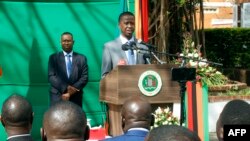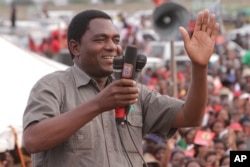Zambia's parliament voted on Tuesday to extend the state of emergency by three months, the presidency office said, as tensions rose following the arrest of the main opposition leader.
Africa's second-largest copper producer, is usually seen as one of the continent's more stable democracies. But it has been on a political knife-edge since the detention in April on treason charges of Hakainde Hichilema, who narrowly lost to President Edgar Lungu in a bruising election last year.
Lungu invoked the emergency powers last week to deal with "acts of sabotage" by his political opponents, after fire gutted the country's biggest marketplace.
'Necessary to restore public order'
On Tuesday, Zambian lawmakers voted to extend the state of emergency by another 90 days to give law enforcement agencies “enhanced measures” to curb “rising cases of politically motivated fires and vandalism of vital electricity supply lines.”
“The measures ... were deemed necessary to restore public order,” Lungu's aide, Amos Chanda, said in a statement.
Chanda said civil liberties such as free movement had not been suspended and businesses would be allowed to operate as normal.
Lungu's move last week to impose emergency laws came within a day of the fire that destroyed part of City Market in the capital Lusaka.
Nobody was killed or injured in the blaze, which the president said "bordered on economic sabotage" and was aimed at making the country ungovernable.
Bridges, power stations targeted
Police have said some people also planned to vandalize installations including bridges and power stations.
They said one person was taken into custody for trying to torch a bus station and they were seeking others who vandalized electricity transmission lines near the capital last month.
Hichilema, leader of the United Party for National Development, was arrested in April at his home and accused of trying to overthrow the government.
An economist and businessman widely known by his initials “HH,” Hichilema was defeated last August by Lungu in an election the opposition politician denounced as fraudulent. His attempts to mount a legal challenge have been unsuccessful.













